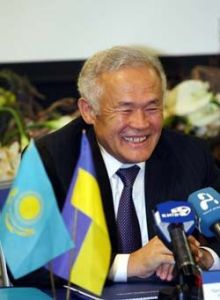Kazakhs owe everything they have obtained during the years of independence — democratic traditions, statehood, and sovereignty — to their Constitution. This was stated in Kyiv by Extraordinary and Plenipotentiary Ambassador of the Republic of Kazakhstan to Ukraine Amangeldy Zhumabayev. Entire Kazakhstan recently celebrated its second most important holiday after Independence Day — the 14th anniversary of its Constitution.
In Ukraine’s capital the Kazakh diplomat told mass media representatives about the constitutional experience of his country. According to Zhumabayev, in the transition period, when Kazakhstan needed a strong government which would force everyone to play according to certain rules, the presidential form of rule was provided for in the Constitution. However when the country’s situation gradually returned to normal, the Constitution was amended, and now Kazakhstan is a presidential-parliamentary republic.
For example, now the parliament may initiate the dismissal of the government, whereas only the president could do this before. At the briefing Zhumabayev reminded that Kazakhstan’s Constitution, adopted on Aug. 30, 1995, defined the country’s statehood. A great deal of work preceded its adoption: experts had studied other countries’ experience and analyzed nearly 30,000 proposals, which they received during a nationwide discussion of the draft constitution. As a result, over 1,100 amendments were made, and 55 out of 99 articles were considerably revised.
Kazakhstan’s ambassador to Ukraine believes that a constitution should be long-lasting — only then will it guarantee security and stability. He recognized, though, that when society is “growing,” the constitution should “grow” too. And making amendments is the best way for it to mature.
Zhumabayev acknowledged that Kazakhstan is facing criticism: “Someone believes that there should be more democracy. Of course, there is a need for democratic changes, but society must be ready for their implementation… Freedom should be framed by the law.” At the same time, he admitted that the highest number of amendments in Kazakhstan is demanded by the mass media.
According to Zhumabayev, the years of independence have also given impetus to Kazakhs to reconsider their own history. For some time a program aimed at helping the nation get to know itself was operating in Kazakhstan. With this aim a group of academics was studying archival documents in the world’s largest libraries in Vatikan, Paris, and London. The discovered data throw light on ancient history and the important role of the Kazakh people. In particular, information on correspondence between the Kazakh Khanate and Chinese emperors was found.
In spite of the economic crisis and the twists and turns of political life, Zhumabayev called for Ukrainians to be optimistic. “I am sure Ukraine has a great future. Both Ukraine and Kazakhstan are moving to a new state. A new state is always painful.” He reported that he had recently travelled through the country’s regions and saw fields in good condition. Therefore, the ambassador said, “the Ukrainian people will provide itself with food, and even share it with others.”
“The people’s strength is in its diligence,” Zhumabayev underlined. He also said that nearly half a million Ukrainians reside in Kazakhstan, which helps develop relations between the two countries. At the same time, Kazakhstan regards Ukraine as a big market and a sort of “a window to Europe” in terms of economy. On its part, Kazakhstan may assist Ukraine in entering the Asian market, said the ambassador.
He admitted that over the last year the world crisis has had an impact on the economic cooperation. However, now the prospects of creating joint Ukrainian-Kazakh enterprises in Kazakhstan are being discussed. “Kazakhstan should by all means become a springboard for Ukraine in penetrating into the Asian market, and a lot is being done to this end,” Zhumabayev said. “This will be useful for both Kazakhstan and Ukraine,” the diplomat admitted.
In his words, Ukraine is now viewed in Kazakhstan as a “big European state, which has its own capacious market and at the same time is a sort of a transition station in improving of our relations with the European Union.” “Next year we will hold presidency in the OSCE, and the main question will concern greater economic proximity with European countries. Of course, we cannot do without Ukraine here,” Zhumabayev said.
What regards the financial crisis, Kazakhstan has managed to overcome it and even benefit from it: they have taken advantage use of the occasion to modernize the infrastructure. Kazakhstan started developing anti-crisis programs when the first signs of instability of the world economy manifested themselves. In the framework of this program the state took stronger control of private banks (not in an administrative way, but via buying stakes in them). The diplomat assured that Kazakh citizens have no problems with deposits.
The Day’s FACTFILE
Kazakhstan is a unitary presidential-parliamentary republic. Its first constitution was adopted in January 1993. However, already in August 1995 it was replaced with a new constitution; in 1998 the latter was amended. The president is the head of the state and determined the directions of the country’s home and foreign policy. The president also guarantees the coordinated functioning of all bodies of power. He is elected for a five-year term by general, secret vote of citizens aged over 18.
The position of the President of Kazakhstan was established on April 24, 1990, and has since then been occupied by Nursultan Nazarbayev. The government of the Republic of Kazakhstan is the supreme body of the country’s executive power. The government is headed by the prime minister (at the moment this office belonogs to Karim Masimov). The supreme representative legislative body is the country’s parliament, which consists of two houses — the Senate and the Majlis. The supreme bodies of judiciary power are the Supreme Court and the Constitutional Council.
Kazakhstan has a comparatively large area (ninth place in the world), which is comparatively scarcely populated (15.85 million people – 61st place in the world). At the same time, it possesses large amounts of natural resources: oil, rock gas, and various minerals.







